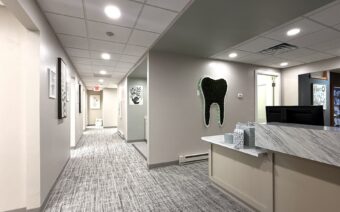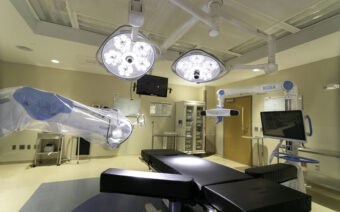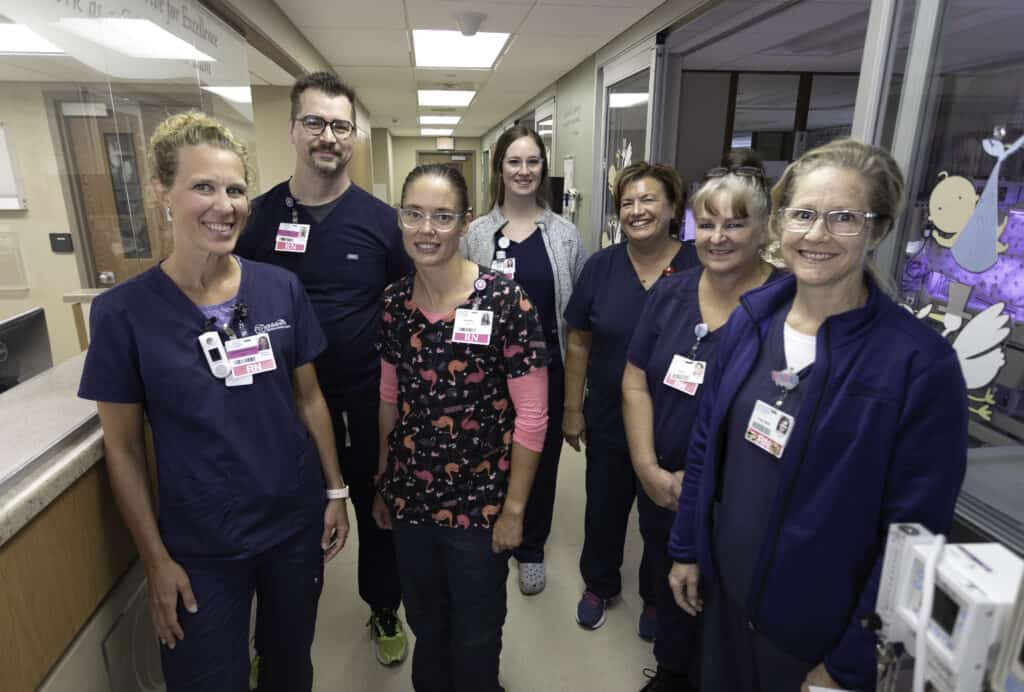
October 7, 2024
GREEN BAY – For the past 55 years, HSHS St. Vincent Children’s Hospital Newborn Intensive Care Unit (NICU) has provided care to more than 10,000 of the most vulnerable babies from Northeast Wisconsin, the Lakeshore and Upper Peninsula of Michigan – making it the first and longest serving NICU in the Greater Green Bay community.
Jim Burke, NICU nursing manager at HSHS St. Vincent Children’s Hospital, said NICUs play a crucial role in today’s healthcare system by providing specialized care for premature newborns, have low birth weights or suffer from serious health conditions.
NICUs, Burke said, assist families with newborns in very distinct ways, such as:
Advanced medical care: NICUs are equipped with advanced technology and are staffed by highly trained, highly specialized nurses and other healthcare professionals who can provide intensive medical care to the tiniest and most vulnerable of patients.
This includes providing support for breathing, feeding and other critical functions that premature or seriously ill infants sometimes struggle with.
Improved survival rates: The development and evolution of NICUs have significantly improved the survival rates of premature and critically ill infants.
Innovations in medical technology, medications and treatment protocols have led to better outcomes for these babies.
“The mortality rate in 1969 – when our NICU started – was not good at all, across the nation,” Burke said. “For every 1,000 live births, there were about 20 or 21 deaths. About half of the deaths at that time were coming from premature and sick babies. That number has now come down to under six per 1,000 live births.”
Family-centered care: Modern NICUs emphasize the importance of keeping families involved in the care of their newborns.
Burke said this approach not only supports the emotional well-being of the family but also contributes to better health outcomes for the baby.
Specialized nursing care: NICUs provide specialized nursing care for babies who may not be critically ill but still require close monitoring and medical attention.
Burke said this ensures all newborns receive the appropriate level of care based on their specific needs.
Support for high-risk births: Babies born with health conditions such as breathing difficulties, heart problems, infections or birth defects benefit greatly from the specialized care available in NICUs.
Such support, Burke said, is essential for helping these infants make the transition to life outside the womb.
“We have a very large labor/delivery unit here and they work closely together,” he said. “We go to every high-risk delivery that’s here. That way, we’re right there and can make a decision in a moment’s notice as to whether a baby needs to be admitted to the NICU.”
First in Northeast Wisconsin
As the first and longest-serving NICU in the Greater Green Bay community, Burke said HSHS St. Vincent Children’s Hospital has a team that includes neonatologists, neonatal nurse practitioners, nurses, respiratory therapists and developmental therapists.
“We’re equipped to offer expert level, compassionate care to all the babies that come through our doors,” he said. “The fact that we’ve been providing specialized infant care for 55 years now is something our team is very proud of. We’re here for families during some of the hardest moments in their lives and proud to continue to be here when families need us most.”
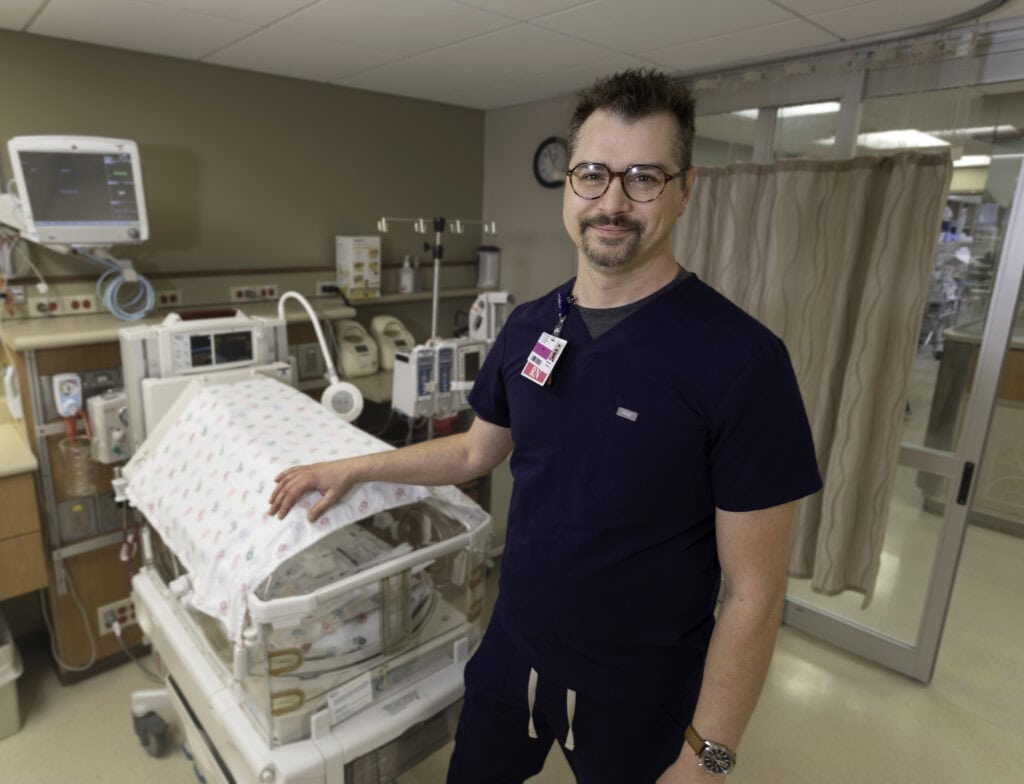
Located just steps away from HSHS St. Vincent Hospital’s Women and Infants Center, where mothers give birth, Burke said the HSHS St. Vincent Children’s Hospital NICU provides the dedication, expertise and technology needed to care for the most critical babies.
Providing immediate, 24/7 care of infants born prematurely, with low birth weights, congenital birth defects or unanticipated difficulties that may happen during delivery, Burke said, allows families to rest assured knowing they and their baby are in the best of hands.
In fact, he said the neonatologists, nurses and other providers and staff in the NICU there provide patients a combined 840 years of neonatal intensive care experience.
Burke said HSHS St. Vincent’s NICU stands out from other NICUs in technological advances, too
“We’re the only ones in Green Bay who do whole body cooling, which is a special form of treatment if a baby has some hypoxia or some potentially low oxygen levels or stress at birth,” he said. “No one else in Green Bay can do this specialized treatment. We have a neonatologist, as well as a neonatal nurse practitioner, who are in the building 24 hours a day. I think that also sets us apart.”
Offering telemedicine to providers in rural communities is something else Burke said not all NICUs offer.
If a provider is worried about a newborn, Burke said they not only call St. Vincent’s, but the NICU experts at St. Vincent can see the baby on a computer screen, where they can assess it by looking at the infant, they can listen to the child’s breathing and heart rate, then help those other providers make a decision if the baby needs to be transported to St. Vincent or can remain at the hospital it’s currently at.
“That telehealth capability really makes it crystal-clear what’s going on and allows everyone to make much better decisions,” he said. “I think we’re on the cutting edge by having this technology and being able to serve facilities in rural areas.”
“This year alone, we’ve done more than 60 transports, where our teams leaves the hospital, going out into these other smaller, rural communities, gets the patient and brings them back here to St. Vincent,” he said.
Admitting a newborn to a NICU is more common than many realize.
According to the National Institutes of Health, approximately one in 10 infants born in the United States each year are admitted to a NICU.
Across Northeast Wisconsin, the Lakeshore and Upper Peninsula, Burke said it’s estimated that more than 60 babies in 2023 alone were transported from other area hospitals to HSHS St. Vincent Children’s Hospital NICU to receive expert level care.
Advancing technology
Burke said the continued advancement in technology allows them to provide the best possible care for the baby and its parents – including a program called Infant Driven Feeding (IDF).
Because a baby’s hunger helps determine when and how much they eat by mouth, Burke said IDF is a feeding method that helps caregivers understand and support a baby’s feeding needs and abilities.
“That kind of technology is something that wasn’t here 10 years ago,” he said.
St. Vincent is also in the process of purchasing some new phototherapy equipment, which Burke said is used for helping premature or critically-ill babies get rid of bilirubin, a substance in the body that can often result in jaundice.
“Very premature babies are automatically put on phototherapy because the baby can’t get rid of bilirubin on their own,” he said.
Burke said St. Vincent is always looking at research and what the best ways are for providing care for patients.
“It might be a change in practice or purchasing new equipment or devices,” he said. “If it’s something that’s better than what we’re currently doing, and there’s evidence to support its use, we give it every consideration.”
Highly trained, as well as compassionate
Having a professional and dedicated staff that is highly-trained in this highly-specialized area, Burke said, is so important in providing the best patient care.
“Patients seem to be getting younger and younger and we’re skilled enough to be able to care for those younger patients,” he said. “Every few years, that line in the sand of babies that couldn’t survive otherwise keeps moving down as we have more technology and more highly-specialized nurses who can take care of those younger patients.”
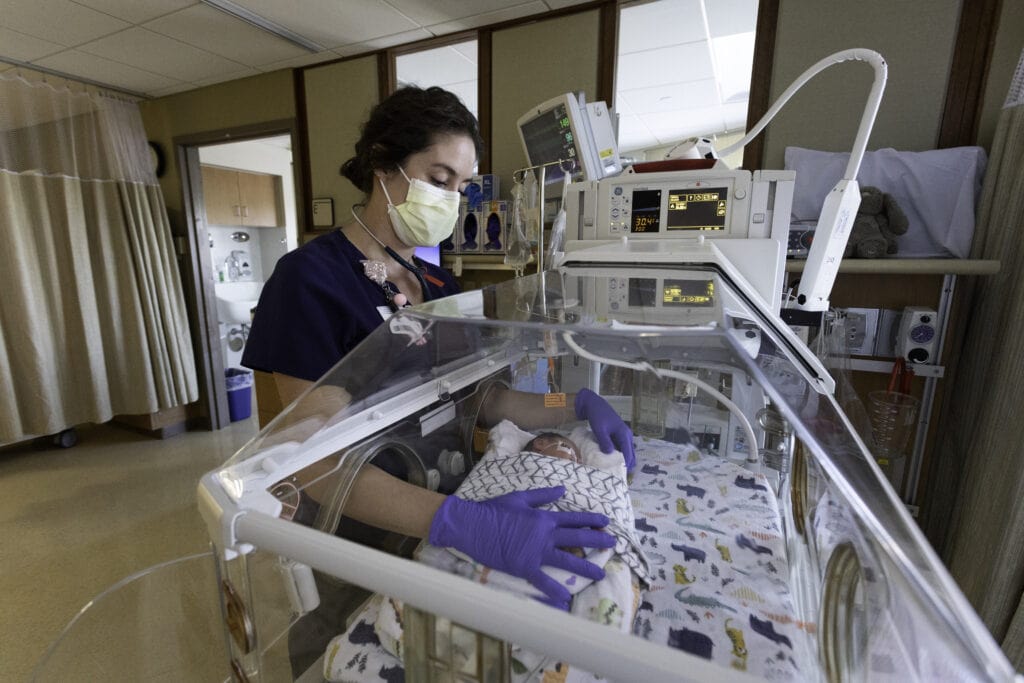
Ongoing training and education, Burke said, is important for NICU professionals because there typically isn’t advance warning as to who their patients are going to be and what their situation is.
“We may get a bunch of very sick patients, or several who are very premature,” he said. “Then we may not get those very sick or very premature patients for a long time. We try hard with education – digital education, hands-on education, mock training and mock codes – and we also use infant mannequins to help keep those skill sets maintained.”
Burke said it’s also important to ensure a great culture so employees want to stay at St. Vincent.
“That can be hard to do, especially when it’s so specialized and everything we do is different,” he said. “Every vital sign is different, every lab is different and things can change in an instant, sometimes multiple times in a day. So we also have a very robust orientation and on-boarding program to get new nurses, and even experienced ones who are new to the NICU trained, competent and up-to-speed with our population in the NICU.”
Being able to help critically-sick infants get better, and watch them go home with mom and dad, Burke said, “is phenomenal and a great joy to be a part of.”
“To lead a team of nurses who provide that kind of specialized care, is very rewarding,” he said. “Not only do they have this incredible skill that nobody else has but they deliver it in a kind, caring, compassionate way – knowing their patients cannot talk, or tell them where it hurts or what’s going on.”
Being able to assess a patient’s condition and needs, and then care for them, while at the same time helping parents who are dealing with a very traumatic time in their lives, Burke said, requires a very different skill set.
Burke, who has only been on the job at St. Vincent since this past April, said it was the culture of care that sold him on the place.
“Many people see health care today as a business whose No. 1 goal is to drive costs down or keep costs contained,” she said. “We don’t do that here. We absolutely take care of the patient first. I think we do such an amazing job of caring for these patients, especially as a nonprofit Catholic Health System. We have so many families who come back to us and say ‘thank you for the medical treatment and the way you cared for us.’ That’s heartwarming and really is what this is all about.”
 Bear Bones Winery embraces ‘rustic elegance,’ local fruit, passion for music
Bear Bones Winery embraces ‘rustic elegance,’ local fruit, passion for music Treankler’s business playbook leads Green Bay Blizzard to success
Treankler’s business playbook leads Green Bay Blizzard to success


